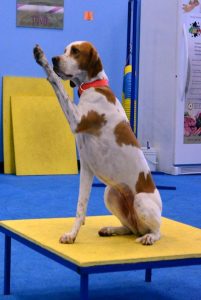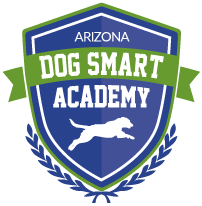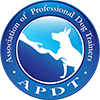The More You Ask, The More You Know
If you are one of the many people currently taking an obedience class or fun activity class with your dog, you are to be commended for that choice! Your dog will bond with you and enjoy learning new skills and activities. As for the human component of the equation, don’t be afraid to try many of the varied dog sports, tricks, scent work and agility you can.
Trying different trainers can also be fun, and it may challenge your level of knowledge.
There is so much to know, and so many ways to learn. Many people are confused when a new trainer suggests a method they are not familiar using. At our training center in Phoenix, AZ, we have 10 trainers; all with different specialties. The common thread is that all the methods are linked to science based training, and our preference is using positive reinforcement. The differences are as varied as the trainer’s personalities.
How to pick the right trainer for you and your dog
If you are not an outgoing, gregarious person, you may prefer to be taught by someone whose teaching style is more in line with your personality. Maybe a calm, soft spoken and intentional trainer is a better fit for you. If you are extroverted, and more willing to try new skills; maybe a high activity class with lots of action is more your style. If you like structure, precise directions and planning details, you may not want a trainer that focuses on the big picture and varies exercises extemporaneously. Try to pick a trainer that you feel comfortable interacting with who can help you with trying new strategies and methods.
Asking Questions Improves Learning
We encourage that you express any concerns, questions and opinions with your teacher after class. When students are in college they frequently challenge their professors by offering opposing opinions or asking questions in class. In adult education, we rarely see that because many students presume that they are learning from “the expert” and they generally defer. Any trainer worth their weight, will want you to ask for clarification or add information that may be pertinent to improve the approach to learning.
While I am not suggesting that you argue with your trainer, I do think it is good to question why one method is better than another. A person may need clarification to implement a technique. I find that all too often students feel intimidated or unable to ask a question in a non-confrontational way. Well-thought-out questions are valuable to any teacher, and make them better at their profession.
Yes, dogs can question too
It is an important part of the learning process that trainers, handlers and even dogs get to ask questions as to what is expected from them. If your dog does not understand what you are asking of him or her, try a different approach. It is the least you can do, and the most proactive way to participate in the success of your pet training. All trainers have varied creative methods to improve your enjoyment of your life with your pet.
Make the most of the fact that they all have something to teach you if you are willing to try.




Carla says
Thank you for the comment!
We kind of like our trainer Will Bruner too!
P.S. Did Wonderful Will put you up to this? 🙂
Rio DeOro says
I really liked that time was set aside in my Friday Obedience I class for questions. It made it much easier to ask questions and not feel like you were disrupting the class. Almost everyone had a question.
PS: The Will is wonderful!